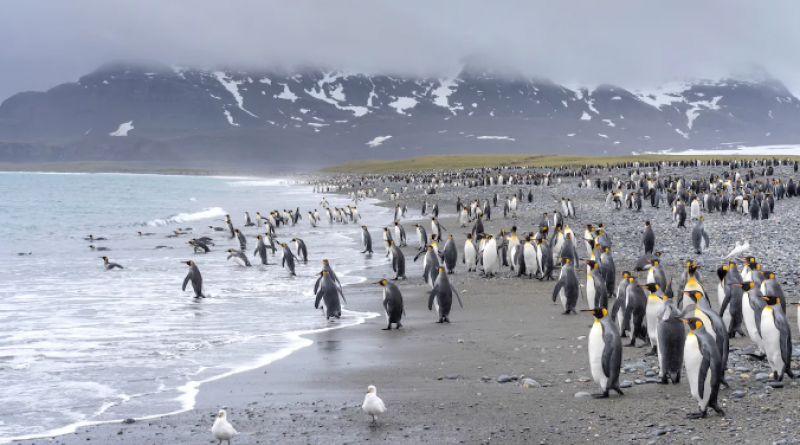Antarctic Penguin Poop Emits Laughing Gas.

A colony of king penguins in Antarctica emit so much nitrous oxide, or laughing gas, in their poop that researchers went a little "cuckoo," while studying them, according to Agence France Presse, which reported on a new study published in the journal Science of the Total Environment.
The study looked at the effects of a king penguin colony's activity on soil greenhouse gas fluxes in South Georgia, an island just north of Antarctica. One finding in particular was notably unique—penguin feces, or guano, produce extremely high levels of nitrous oxide, as CNN reported.
The scientists from the University of Copenhagen in Denmark were investigating the effect of glacier retreat and penguin activity on greenhouse gas emissions. They decided to take samples from South Georgia Island since it his home to over 150,000 breeding pairs of king penguins, as Newsweek reported.
"After nosing about in guano for several hours, one goes completely cuckoo," lead researcher Bo Elberling said in a statement, as Newsweek reported. "One begins to feel ill and get a headache. The small nitrous oxide cylinders that you see lying in and floating around Copenhagen are no match for this heavy dose, which results from a combination of nitrous oxide with hydrogen sulphide and other gases."
Penguin poop is known to create huge amounts of nitrous oxide because the penguins' diet is rich in fish and krill that have absorbed large amounts of nitrogen via phytoplankton. The nitrogen is then released from the guano. When it hits the soil and interacts with the air, it is converted to nitrous oxide.
Nitrous oxide is a potent greenhouse gas, with a warming effect that is 300 times what carbon dioxide produces, according to Newsweek. It's also used as a sedative for dental procedures, as a recreational drug and in agriculture.
"Penguin guano produces significantly high levels of nitrous oxide around their colonies. The maximum emissions are about 100 times higher than in a recently fertilized Danish field," Elberling said in a University of Copenhagen press release, as CNET reported.
On their own, the penguin guano is not nearly strong enough to affect the earth's atmosphere, but it is clear that the penguins affect their local environment, which is important as colonies grow and move to adapt to a changing climate, as CNN reported.
"A future expansion of penguins into newly available ice-free polar coastal areas may therefore markedly increase the local (greenhouse gas) budget," the study says.
"Penguins have been considered to be an ideal 'bio-indicator' of ecosystem and environmental changes, as changes in populations and colonies reflect direct and indirect ecological responses to climatic changes," the authors wrote in the study. "Changes in penguin colonies, penguin activity and the associated addition of guano are known to significantly influence terrestrial soil and ecosystem processes and thereby can turn soils into [greenhouse gas] emission hotspots."
Eberling added that future research may add to an understanding of how the droppings affect the earth and its atmosphere, which could help mitigate greenhouse gas emissions, according to CNN.
21 May 2020
EcoWatch




